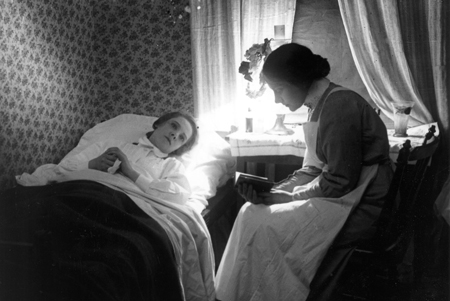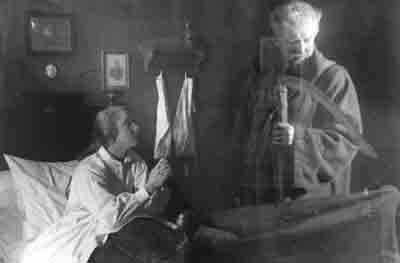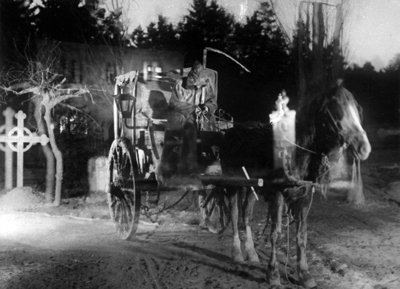
 |
|
|
|
The great film restorer and documentarian Kevin Brownlow opened our eyes with his TV documentary Cinema Europe: The Other Hollywood. One of the biggest surprises of that mini-series was an episode on the Swedish Cinema in the 'teens and 1920s, showing clips of beautifully filmed stories with naturalistic acting, strong emotions and serious themes. One of the prime Swedish masterpieces is 1921's The Phantom Carriage, called Körkarlen in Sweden. It was made by and stars Victor Sjöström, the country's greatest filmmaker until the rise of Ingmar Bergman in the 1950s. Victor Sjöström is known today mostly from his role as the old man in Bergman's Wild Strawberries. 
Adapted from a novel by popular writer Selma Lagerlöf, The Phantom Carriage would seem to combine elements from Dickens' A Christmas Carol with a spooky ghost story. The overall somber mood could be described as a grim inverse of It's a Wonderful Life: a man gets a chance to review his life, which has definitely not been one of virtue Salvation Army nurse Edit (Astrid Holm) is on her deathbed. She has dedicated her last years to trying to reform the alcoholic David Holm (Sjöström), but as it is New Year's Eve, he would rather continue drinking in a cemetery with his friends than go to her bedside. When he's suddenly killed at the stroke of midnight, David learns that his spirit must undertake a terrible task. The last person to die each year must take over the role of Death, riding in a ghostly wagon to claim the souls of those who pass away. David reviews his life, and must face up to the terrible way he destroyed his family on the way to this ignominious demise. What first strikes us about The Phantom Carriage is how beautiful Sjöström's film looks. The interior lighting has a modeled Rembrandt look, and the exteriors are equally carefully composed. The camera doesn't move much, if at all, but night scenes appear to be filmed mostly at night, with colored tints judiciously applied. The Phantom Carriage exists in a beautifully preserved 35mm copy, and this HD transfer brings out its visual riches. 
The fantastic end of the story is achieved with simple superimpositions, considered quite sophisticated for the time. Inverted negative imagery is used as well; they must have been something of a visual shock. Trick films were of course very popular by the early '20s. Kölaken's phantom coach is accepted not as a special effect but as an intrusion of the spirit world on our own. The movie makes strong use of a death figure carrying a scythe. Ingmar Bergman and Victor Sjöström shared an interest in fatalistic fantasy, and this picture harmonizes with Bergman's own The Seventh Seal. Seen in flashbacks, David Holm's life is a woeful experience, a realistically tragic morality play about the evils of alcohol. The show slips into horror territory when David, who has already abused his family beyond forgiveness, finds himself locked out. Anybody familiar with Stanley Kubrick's The Shining will recognize the parallel when David reaches for an axe to break the lock. David isn't a psychotic but a conflicted man who simply hasn't a great deal of good in him. Sjöström communicates this complexity without the aid of dialogue. To be honest, The Phantom Carriage is a "heavy" drama that will have a limited appeal to audiences expecting a fast pace or horror movie thrills. The death carriage's appearances are not accompanied by visual fireworks, like the spectral coach of Disney's fanciful Darby O'Gill and the Little People. What we get instead is artful storytelling, fine acting, and beautifully lit visuals from a film that premiered ninety years ago. Sjöström's show has not dated. 
As explained in the Brownlow documentary, the momentum of Swedish film art was broken when Sjöström, director Mauritz Stiller and star Greta Garbo all decamped for Hollywood. Sjöström's short tenure at MGM produced a number of bona fide classics: He Who Gets Slapped (with Lon Chaney), The Scarlet Letter and The Wind (both with Lillian Gish). Sjöström essentially stopped directing when sound came in, when he was fifty years old. But he continued acting almost to his death in 1960. Wild Strawberries was his last film appearance. Criterion's Blu-ray of The Phantom Carriage is derived from an excellent early restoration job completed in 1975. Film archives are surprising us every year with remarkable restorations of vintage pictures, and the quality here equals or betters any of them. We're particularly impressed by the subtle lighting in the claustrophobic interiors. The feature carries two new music options, one by composer Matti Bye and a second experimental track from KTL (Stephen O'Malley and Peter Rehberg). Criterion also offers the film in a standard DVD edition. Historian Caper Tyberg's commentary is packed with information and insight on this Swedish masterpiece. Two featurettes deal with the Ingmar Bergman connection. An excerpt from a 1981 documentary has Bergman speaking about Sjöström's as an inspiration. Peter Cowie's visual essay goes into specifics to chart Sjöström's influence on Bergman's movies. Vintage archival film shows Swedish film executives visiting their studio still under construction. Screenwriter and filmmaker Paul Mayersberg provides a well-researched and insightful analysis of this formative fantasy. He also sees it as similar to It's a Wonderful Life.
On a scale of Excellent, Good, Fair, and Poor,
The Phantom Carriage rates:

Reviews on the Savant main site have additional credits information and are often updated and annotated with reader input and graphics. Also, don't forget the 2011 Savant Wish List. T'was Ever Thus.
Review Staff | About DVD Talk | Newsletter Subscribe | Join DVD Talk Forum |
| ||||||||||||||||||